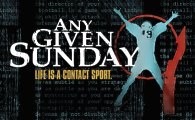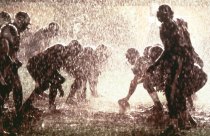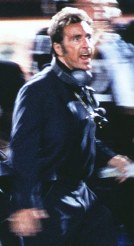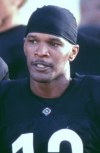|
Any Given
Sunday
|
| |
 |
USA,
1999. Rated R. 162 minutes.
Cast: Al Pacino, Jamie Foxx,
Cameron Diaz, Dennis Quaid, James Woods, LL Cool J, Jim Brown, Matthew
Modine, Ann-Margret, John C. McGinley, Lela Rochon, Lauren Holly, Elizabeth
Berkley, Lawrence Taylor
Writers:
Oliver Stone (screenplay) & John Logan (story and screenplay) based
on the novel of the same name by Pat Toomay and the article, "You're Okay,
It's Just A Bruise," by Rob Huizenga
Music: Richard Horowitz
Cinematographer: Salvatore Totino
Producers: Lauren
Shuler Donner, Clayton Townshend
Director: Oliver Stone
|
| Grade:
C- |
Review
by Jeff Vorndam |
 alf
as long as The Super Bowl, but twice as long as its material warrants, Any
Given Sunday arrives in theaters with all the bone crunching intensity of
a blind side late hit, except that you can see it coming a mile away. Oliver
Stone's crack team of editors (in order to beef up my word count, I will list
them all: Stuart Levy, Thomas Nordberg, Keith Salmon, and Stuart Waks) rattle
off shots like machine-gun fire. It's painful to watch at first, but it has
its own rhythm. If you pay attention to only every third or fourth shot, the
rest can wash over you and work on a subliminal level. As a sensorial evocation
of football, Any Given Sunday acutely captures the bestial working conditions
both on and off the field. It fails, however, to tell a compelling or believable
story or to provide three-dimensional characters.
alf
as long as The Super Bowl, but twice as long as its material warrants, Any
Given Sunday arrives in theaters with all the bone crunching intensity of
a blind side late hit, except that you can see it coming a mile away. Oliver
Stone's crack team of editors (in order to beef up my word count, I will list
them all: Stuart Levy, Thomas Nordberg, Keith Salmon, and Stuart Waks) rattle
off shots like machine-gun fire. It's painful to watch at first, but it has
its own rhythm. If you pay attention to only every third or fourth shot, the
rest can wash over you and work on a subliminal level. As a sensorial evocation
of football, Any Given Sunday acutely captures the bestial working conditions
both on and off the field. It fails, however, to tell a compelling or believable
story or to provide three-dimensional characters. 
The story is essentially the same as any other sports movie. If you've seen
Major League, you have a pretty good template for the plot of Any
Given Sunday. Our team, in this case the Miami Sharks of the A.F.F.A., has
seen better days. They're in the midst of a losing streak, and Coach Tony D'Amato
(Al Pacino) feels his team coming apart at the seams. They were two-time league
champions four years ago, but now many of their key players, like quarterback
Jack "Cap" Rooney (Dennis Quaid), are over the hill. The huge supporting cast
consists of characters with individual problems, tics, or issues that drive
the story to its predictable conclusion--The Big Game. I'll give you three guesses
who wins The Big Game (please, if you need more than two, seek help).
Any Given Sunday is 162 minutes long because it has to work in
the following storylines:
Al Pacino as Coach Tony D'Amato. His personal life is in shambles (divorced,
never sees his kids) and so is his team. An old-guard coach, he still attaches
a larger meaning to football beyond wins and losses. He feels like an anachronism,
and is increasingly frustrated by the intrusions of the young female owner of
the team, Christina Pagniacci (Cameron Diaz). 
As the owner, Pagniacci finds herself an overwhelmed minority. Football
is a man's world, from the gridiron up to the box seats, and she is constantly
second-guessed and dismissed by staff and fellow owners. She represents
the new breed though, where profitability is more important than loyalty
or tradition. She also works under the shadow of her late father, a well
respected and established figure in the sports and business worlds. She
must stake her own claim.
Dennis Quaid is Cap Rooney. At 39, he's struggling to maintain his play at
the level his teammates and fans expect. Early in the film, he goes down with
a crushing injury that knocks him out of action for weeks. Addicted to pain-killers,
Rooney rushes through the rehabilitation process in an effort to win his job
back. His wife, Cindy (Lauren Holly), is unsupportive. She's become accustomed
to Cap's fame and money and is upset when he suggests that his time may have
passed.
Cap's competition for the quarterback slot is young Willie Beamen (Jamie
Foxx), a third-string seventh-round draft choice who is catapulted into
the limelight after Cap (and the back-up quarterback!) go down in the same
game. Beamen is brash, talented, and dyspeptic. He's representative of
the new breed of ballplayer--more concerned with how he looks and how much
he gets paid than anything else. He particularly clashes with D'Amato,
especially by choosing to run his own plays in the huddle (which D'Amato
somehow doesn't realize for a couple of games!).
James Woods is the team's doctor, Harvey Mandrake. His primary function in
the movie is to provide a sneering source of evil, a task for which Woods is
always prepared. As the doctor, he overmedicates players, diagnoses unfit players
as healthy, and bristles when his idealistic (naive) assistant (played by Matthew
Modine) suggests he consider what's best for the health of the players. Off
the field, he's a world-class pussy hound. (If that sentence seems like an offensive
non sequitur, that's the way the character comes across in the film--unnecessary
and vulgar.)
LL Cool J is Julian Washington, the Sharks' star running back. The new pass-oriented
offense spearheaded by Beamen takes the emphasis off of Washington. He's upset
because that means he won't get the requisite number of ball carries and yards
needed to earn his year-end bonus. Similarly, the legendary Lawrence Taylor
plays defensive captain Shark Lavay, an elder statesman on the team whose injury
puts his bonus in doubt. He's told his life will be at risk if he re-enters
the game, but he's allowed to go for the cash anyway. Ann-Margret plays Margaret
Pagniacci, Christina's mother. She spends her days drinking and flirting with
D'Amato. Finally, it wouldn't be an Oliver Stone movie without John C. McGinley.
This time he's an arrogant sportswriter named Jack Rose, who fawns over the
new talent and has it out for Coach D'Amato (as does everyone in this movie,
it seems). 
Oliver Stone doesn't limit his scope to professional football. He wants the
scenario of the Sharks to stand as a critique of current society, masculinity,
and television. He has too much on his plate though. Only the most obvious connections
are made: football is like war (the games are choreographed so similarly to
the action in Platoon, you wait for Charlie Sheen's voiceover to kick
in), its participants are modern-day gladiators (driven home in a scene between
D'Amato and Beamen which is accompanied by Ben Hur on a TV in the same
room), and television has corrupted a once noble sport. The latter point is
probably the best expressed theme in the movie, as the television revenue (reliant
on advertising from big corporations) looms like a specter behind most of the
actions undertaken for the team's success. None of the characters feel like
anything more than "movie" characters though, which robs the film of any verisimilitude.
The relation to the real world is further strained by the many mistakes in
the depiction of the game of football. Touchdowns are awarded seven points without
extra points being kicked. The scoreboard shows inaccurate scores, and lists
the home team first instead of last. The Sharks wear the same uniform color
regardless of whether they play at home or away. The team names are pretty rediculous
too--the Sharks play The Emperors, The Americans, and the Icemen. Penalties
are called that go the wrong way. No one ever gets called for a late hit, though
there are several. (Excessive endzone celebration isn't penalized either.) And
I'm not sure what professional wrestling circuit Stone cast the offensive line
from. This would all be excusable if Stone clearly made this a fictional universe,
but characters drop names of former players like Johnny Unitas and Barry Sanders,
so his league comes off as laughably inaccurate. The most incredible plot aspect
is Willie Beamen's improbable ascendency to superstardom. Within a mere two
games, the former nobody is now on the cover of several national magazines (not
even sports magazines, we're talking Time here) and star of a hit music
video that has reached #13 on the charts. I realize the media glare is overstated
here, but this is beyond belief. The end result is a film I could not take seriously.
As Stone piled on more outrageous incidents (including a visit by the female
owner to the locker room), it shifted from pointed commentary to slapdash parody.
I started noting the parallels to the sophomoric Major League (Foxx's
Beamen is the Wesley Snipes character, Quaid's Rooney is the Tom Berenger one,
and Diaz' Pagniacci is Margaret Whitton's female owner). Finally, Oliver Stone
continues his streak of writing unsavory roles for his female characters, as
most of them in this movie are harpies, gold-diggers, ditzes, alcoholics, or
prostitutes.
AboutFilm.Com
The Big Picture
|
| Carlo |
C+
|
| Alison |
B-
|
| Kris |
B-
|
| Jen |
-
|
| Dana |
C-
|
| Jeff |
C-
|
The performances are good fun, though. I was impressed by the former players--Jim
Brown does his best work since Fingers as an assistant coach and council
to D'Amato, and Lawrence Taylor is surprisingly touching in a steam room scene
where he persuades Beamen character to think of his role, his future, and of
the others around him. Jamie Foxx is convincing as the strutting and preening
young QB who grows up in a hurry. Though a role which requires a lot of yelling
would seem ideal for Al Pacino, he's hardly the archetype for a professional
football coach. Lou Holtz probably towers over Mr. Pacino. I thought Coach D'Amato's
woes and desires were uninteresting, and it isn't until a speech before The
Big Game that I took any notice of Pacino's performance. Saving the worst for
last, Cameron Diaz, though a fine actress, was never believable and essentially
out her league. By contrast, imagine how much better her Being
John Malkovich co-star Catherine Keener would have been in the same
role. She could have played ball with these fellows.
Oliver Stone appears to be on a greased track to hackdom with his last few
movies. He peaked with JFK and has produced diminishing returns ever
since. Nevertheless, his movies still provoke and demand to be seen, despite
their flaws. If you do catch Any Given Sunday, see it in theaters, where
Stone's maelstrom of images can pulverize you into submission.
Review © January
2000 by AboutFilm.Com and the author.
Images © 1999
Warner Bros. All Rights Reserved.




